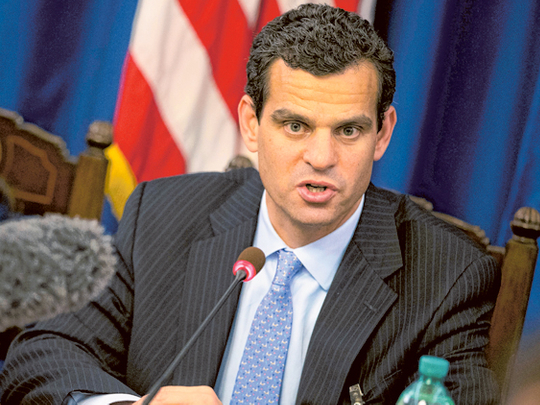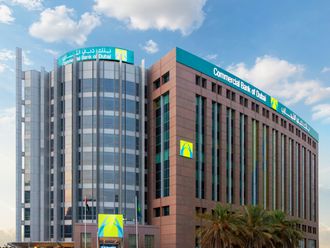
Dubai: Regional and international businesses are raving about the immense business opportunities that Iran offers when the international sanctions end. Global bankers and oil executives are waiting with their bags ready to board planes to Tehran in search of those big deals ranging from oil exploration, refining, trading and infrastructure development.
The recent thaw in relations between the West and Iran following the latter’s agreement with the so-called P5+1 (Britain, China, France, Germany, Russia and the United States) on an interim deal on its nuclear programme, has raised the hope among Iranian and international banks and oil companies that the economic sanctions are on its way out.
The aim of the interim agreement that was reached in November in Geneva is to freeze much of Iran’s nuclear programme for six months so that international negotiators can pursue a more comprehensive accord.
While the international business community likes to believe that the Geneva talks are a beginning of an end to the international sanctions, the US Treasury Department does not share their enthusiasm. On the contrary it has poured cold water on the euphoria surrounding expectations that soon Iran will be open for business
On a recent visit to the UAE, David S. Cohen, Under Secretary for Terrorism and Financial Intelligence at US Treasury, spoke to Gulf news on the scope of recent sanctions relief offered to Iran as part of the Geneva talks aimed at reaching a comprehensive deal with Iran on its nuclear programme.
Gulf News: Is there any specific objective for your visit to the UAE in the context of the geopolitical issues concerning the region, especially in the context of international negotiations with Iran on its nuclear programme?
David S. Cohen: My responsibility in the Treasury Department is to focus on combating illicit finance, money laundering issues, terrorist financing and also the implementation of our sanctions programme. My visit here is part of a series of visits I am making to our partners around the world to talk about the current state of the sanctions on Iran. In particular there was an interim deal reached between P+1 and Iran that had some limited sanctions relief while leaving in place a vast majority of the sanctions unchanged. The purpose of my visit here, Turkey, earlier in the week and visits to Austria, Germany and England prior to that were to talk about state of the sanctions on Iran and to make sure that there is clarity on the issue among our partners. The interim relief to Iran is limited and my brief is to explain how limited really the relief is and clarity on the scope of the sanctions that are in place. So that the businesses and banks in the region don’t mistake that Iran is now open for business.
Q. How limited is the scope of the relief offered to Iran as part of the Geneva talks?
A. The comprehensive sanctions imposed on businesses, banks and financial institutions remain unchanged with very limited relief offered on very specific transactions. Every bank in Iran that has been subject to sanctions from the US and EU are still under those sanctions. The isolation of Iran from the International financial sector is still very much in place. The sanctions on Iran’s energy industry too haven’t changed. The restriction and sanctions on investing in Iran’s energy industry remain in place. It still remains sanctionable to make significant supplies to Iran’s energy industry. Purchase and sale of petroleum products too are sanctionable. So the majority of the sanctions that really had an impact on Iran’s economy, they are still in place. One other really very important sanction that is still in place is the oil sanctions. It has been two years since we have been trying to dry down the oil that Iran has been selling. In the beginning of 2012 Iran was selling about 2.5 millions barrels per day and today they are selling about one million bpd. In the agreements that was reached in Geneva Iran can continue to sell the amount of oil which Iran is selling today but no more. So our sanctions would apply to anyone who is trying to become a new purchaser of Iran’s oil or if it tries to sell more oil than what it is selling today, the sanctions will be applied.
Q: In your December testimony, the Senate Committee on Banking, Housing, and Urban Affairs you termed the relief as limited, temporary and reversible. Does that stand remain the same or in the context of progress in the Geneva talks any move to ease sanctions further?
No. The sanctions relief that was agreed to in Geneva is now in effect and is limited, temporary and reversible. It is limited in the sense that what we have agreed to relax is very narrow aspects of our sanctions. We have agreed to allow Iran to export petrochemicals but not petroleum or oil, we have allowed Iran to import goods and spare parts for it auto industry and engage in transactions in gold and precious metals for six months. That makes it temporary. We have also allowed Iran to have access to a total of $4.2 billion that were inaccessible after the agreed six months. We have also agreed to some humanitarian transactions and some safety related imports for Iranian civilian aircraft. That is it and that is the entire scope of the relief.
Q: There appears a difference in stand of the US administration and congress with regard to sanctions on Iran as the congress is against more measures against Iran?
There is an ongoing effort with our Congress to put in place very powerful sanctions. We had a series of legislations over the past several years. These have helped the administration to create a very powerful set of sanctions around Iran. Where we are today is that we are embarking on this negotiation with Iran. The purpose of the interim reliefs is to create space to proceed with negotiations with Iran and without the fear that during this period Iran will not be making progress in its nuclear programmes. What we have been saying to the Congress is that we don’t need new sanctions authorized. If the talks are not successful and if the Iranians were to cheat we can come back and very quickly impose these sanctions. For the time being the sanctions we have in place are very powerful.
Q: There are huge expectations built around the P+1 talks. The global oil industry, banking and financial services sector and regional business are already making big plans on opportunities to do business with Iran in the post-sanctions era? What is your message to those who are making these plans?
My message, first of all, is that anyone who is contemplating doing business with Iran should be extraordinarily careful because of the extensive and complicated sanctions that are still in place. It is also very significant that firms could face massive reputational risks. Businesses, financial institutions have withdrawn from the Iranian market because of the concern that they are getting into business with Iran that exposes them to the risk of the possibility that Iran will take advantage of these relationships to deceptively advance their nuclear programme. There should be no reason that anyone should think that those reputational risks are any less today than they were previously.
I understand that there is intense interest in the possibility of Iranian market opening up and business opportunities being available. That is something that may come down the road in the future if there is a comprehensive agreement on the nuclear talks and substantial easing of the sanctions. But today that is not the case. Today, the vast majority of the sanctions remain in place and only scope for very narrow economic activity has been opened up. I would urge anyone who is planning to do business with Iran to think twice and consider both legal risks and reputational risks.
Q: Even if Iran is to reach a comprehensive deal on its nuclear programmes, does that mean an end to all sanctions on Iran? In fact, very many sanctions on Iran built up over past several years relate to issues with the integrity of their financial institutions, support to terror networks, militias and organisations that are widely viewed as supporting terrorism?
Absolutely. We have been very clear that the talks in Geneva are very much focused on Iran’s nuclear programmes. What we are trying to accomplish by working with our partners is to make Iran takes necessary steps to prove that its nuclear programme is exclusively for peaceful purposes and it can’t develop nuclear weapons. That is one important issue that Iran has with the international community and the US.
We still have significant issues with Iran’s support for international terrorism, their abuse of human rights, for their support of the Assad regime in Syria and organisation with terrorism links. We are going to continue, regardless of what happens on the nuclear issue to what we can do to combat these. These issues are not part of the ongoing negotiations in Geneva.
Q: With a vast majority of sanctions on Iran that are likely to remain in place, even if the P1+1 talks end with comprehensive agreement on Iran’s nuclear programme, what time frame you expect for Iranian economy and it financial system to get integrated to global economy and financial system?
It is entirely up to Iran. A significant number of sanctions are related to Iranian banking and financial system’s involvement in the nuclear and missile programme. If there is a comprehensive agreement reached within next six months, we believe it can pave the way of lifting these sanctions. This will of course depend on verifiable steps from the Iranian government that their nuclear programme is exclusively for peaceful purposes.
Q: Do you subscribe the view that it was the severity of the sanction that brought Iranians to the negotiating table in Geneva?
There is no question that sanctions have been one of the key motivating factors that brought Iranians to the table in Geneva and to the initial agreements and we believe that it will be a critical component of the progress of the ongoing talks.
Q: What is the role the UAE and Dubai playing as a partner with the US in fighting illicit financial transactions and money laundering?
A: We have had very good relationship with the UAE and Dubai over many years now in addressing concerns about illicit finance, money laundering and terrorist financing. The UAE is a very extensive financial marketplace, as in any large financial system there will constantly be concerns about people trying to take advantage. The efforts that the UAE government is making to regulate their financial system is very strong and we are going to continue to work very closely with them as we do with many other jurisdictions around the world. In addition, major financial centres like Dubai have a self-interest in protecting its integrity to attract global businesses here.











